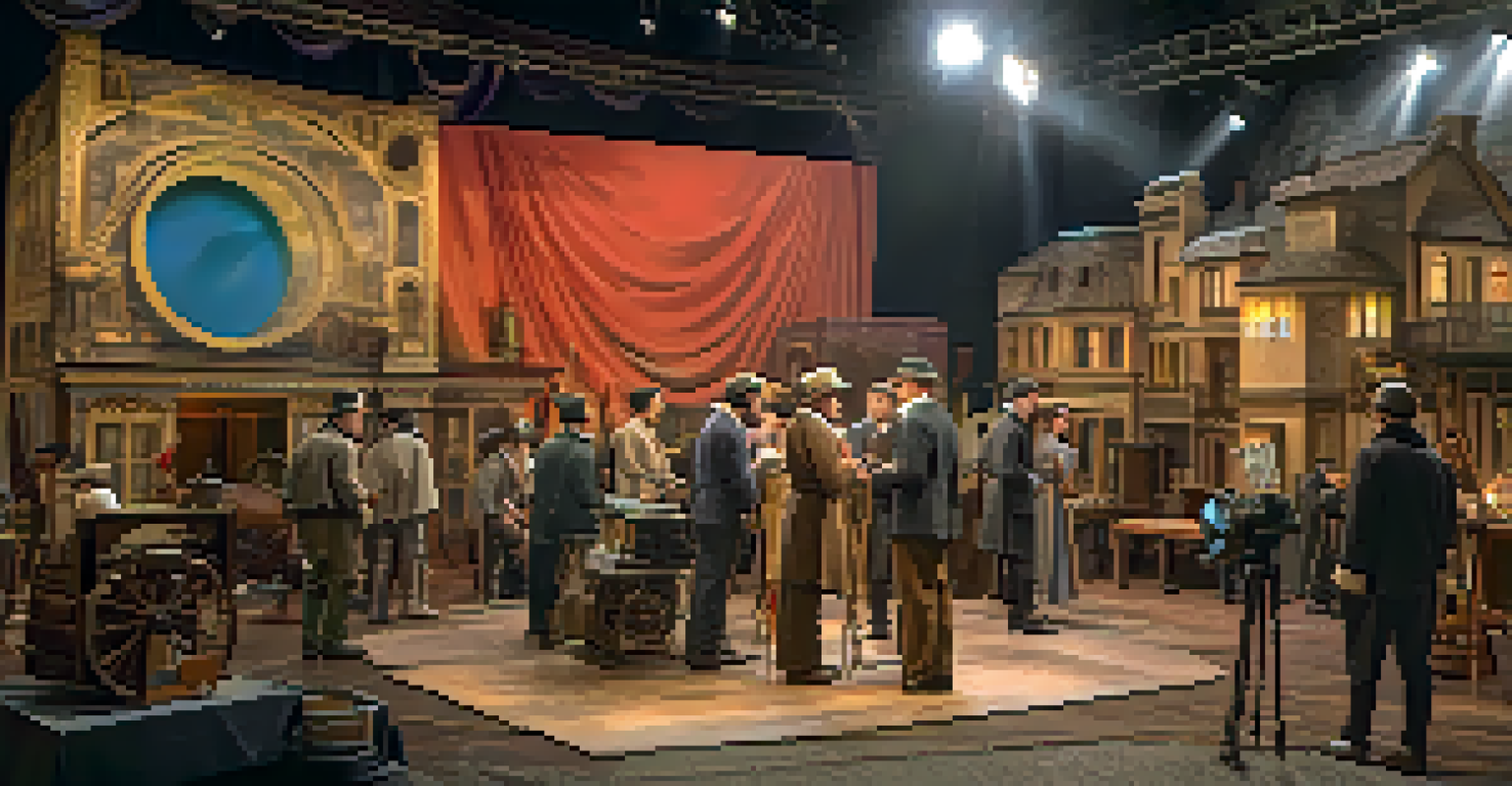Iconic Biopics: How They Captured the Essence of Legends

The Impact of Biopics on Culture and Society
Biopics serve as a powerful medium to tell the stories of extraordinary individuals. They not only entertain but also educate audiences about the lives and struggles of notable figures. By dramatizing real events, these films can inspire viewers and spark conversations about relevant social issues.
Cinema is a matter of what's in the frame and what's out.
For example, films like 'Selma' not only portray Martin Luther King Jr.'s life but also highlight the Civil Rights Movement's significance. This connection to history can motivate viewers to reflect on their own societal roles. In essence, biopics can resonate deeply, often leading to a greater understanding of cultural and historical contexts.
Moreover, the portrayal of these legends helps shape public perception, often turning them into symbols of hope or perseverance. By encapsulating the essence of their subjects, biopics can create lasting legacies that influence future generations.
Crafting Authenticity: The Art of Storytelling
Creating a compelling biopic involves balancing factual accuracy with engaging storytelling. Filmmakers must sift through extensive research to present a narrative that resonates with audiences while staying true to the subject's essence. This process often involves making tough choices about which aspects of a person's life to showcase.

Take 'The Theory of Everything,' which chronicles Stephen Hawking's life. The film beautifully balances his scientific achievements with his personal struggles, making it relatable and inspiring. This blend of personal and professional elements invites viewers to connect on a deeper level, enhancing the film's emotional impact.
Biopics Inspire and Educate
Biopics not only entertain but also educate audiences about significant historical figures and their societal impacts.
Ultimately, effective storytelling in biopics requires a delicate touch, ensuring that the portrayal remains authentic. By focusing on the human experience behind the legend, filmmakers can create a captivating narrative that honors the subject's legacy.
Casting Choices: The Heart of a Biopic
The choice of actor in a biopic is crucial, as it can make or break the film's authenticity. A talented actor must embody not just the physical likeness but also the spirit of the person they portray. This requires extensive preparation and understanding of the character's life and experiences.
The best stories are the ones that move us deeply, that challenge our perceptions, and that remind us of our shared humanity.
For instance, Rami Malek’s portrayal of Freddie Mercury in 'Bohemian Rhapsody' received widespread acclaim. Malek immersed himself in Mercury's persona, capturing his charisma and struggles, which resonated with audiences. This level of dedication to character not only enhances the film's appeal but also creates a genuine connection with viewers.
Moreover, casting choices often reflect the film's overall tone and direction. A well-chosen actor can elevate the narrative, making the life story more engaging and relatable, ultimately inviting audiences to invest emotionally in the journey.
The Role of Music in Biopics
Music plays an essential role in setting the emotional tone of a biopic. It can evoke memories, enhance storytelling, and create a lasting impression on the audience. When done right, the soundtrack can become as iconic as the film itself, often leading to a deeper connection with the subject's story.
Take 'Walk the Line,' which chronicles Johnny Cash’s life. The film features Cash's own music, which not only illustrates his journey but also immerses viewers in the era he represented. This use of authentic music can transport audiences, making the narrative more impactful.
Authenticity in Storytelling Matters
Balancing factual accuracy with engaging narratives is crucial for filmmakers to authentically portray the lives of their subjects.
Additionally, music often serves to highlight pivotal moments in a biopic. By carefully selecting songs that resonate with key scenes, filmmakers can amplify emotional responses, leaving audiences with a powerful experience long after the credits roll.
Visual Storytelling: Cinematic Techniques in Biopics
Visual storytelling techniques are pivotal in bringing a biopic to life. The combination of cinematography, color palettes, and editing can convey the emotional weight of a subject's experiences. These elements help create a visual narrative that complements the screenplay and enhances the overall impact of the film.
For example, 'A Beautiful Mind' employs dim lighting and close-ups to depict John Nash’s struggles with mental illness. These cinematic choices immerse viewers in Nash’s world, making them feel his challenges and triumphs on a personal level. By utilizing visual tools effectively, filmmakers can create a more profound connection with the audience.
Moreover, the use of symbolism through visuals can deepen the audience's understanding of the character's journey. By integrating meaningful imagery, biopics can convey complex themes in a digestible manner, enriching the viewer's experience.
Challenges of Portraying Real Lives on Screen
While biopics aim to tell true stories, they often face the challenge of simplifying complex lives into a two-hour format. The intricacies of a person's life can be lost in translation, leading to potential inaccuracies or oversimplifications. Filmmakers must navigate this delicate balance to honor the legacy of their subjects while crafting an engaging narrative.
For instance, 'The Imitation Game' presents Alan Turing's groundbreaking work in computer science and his personal struggles. However, some critics argue that the film glosses over important aspects of Turing's life. This highlights the difficulty in fully capturing a person's essence within the constraints of a biopic.
Music Enhances Emotional Connection
The strategic use of music in biopics amplifies emotional responses, creating a deeper connection between the audience and the story.
Despite these challenges, filmmakers strive to create a compelling narrative that resonates with audiences. The goal is not just to document a life but to evoke emotions and spark conversations, making the biopic a powerful storytelling medium.
The Legacy of Iconic Biopics
Iconic biopics leave a lasting impact, often shaping the way we understand historical figures. By bringing these legends to life, filmmakers can influence public perception and foster appreciation for their contributions. The stories told through biopics can ignite interest in the subjects, prompting viewers to explore their lives further.
For example, 'The Social Network' sparked discussions about Mark Zuckerberg's role in shaping social media. Through its portrayal, the film not only entertained but also encouraged audiences to reflect on the implications of technology in modern society. This illustrates the potential of biopics to extend beyond mere storytelling.

Ultimately, the legacy of a well-crafted biopic can resonate for years to come. By capturing the essence of their subjects, these films can inspire future generations to learn from the past, ensuring that the legends continue to live on.
Conclusion: The Power of Biopics in Storytelling
In conclusion, biopics serve as a remarkable art form that bridges the gap between history and entertainment. They allow audiences to connect with legendary figures, making their stories accessible and engaging. By capturing the essence of real lives, biopics can inspire, educate, and entertain, creating a multifaceted experience.
Through effective storytelling, authentic casting, and powerful visuals, filmmakers can create biopics that resonate deeply with viewers. These films not only celebrate the achievements of their subjects but also highlight the human experience behind the legend, inviting audiences to reflect on their own lives.
As we continue to explore the lives of remarkable individuals through film, the power of biopics remains undeniable. They have the ability to shape perceptions, spark discussions, and inspire change, ensuring that the stories of legends endure for generations to come.